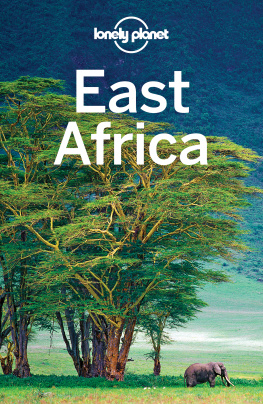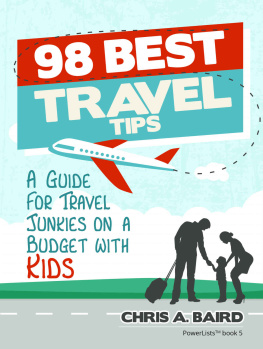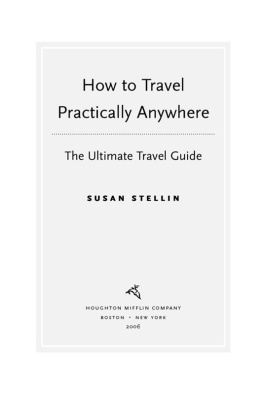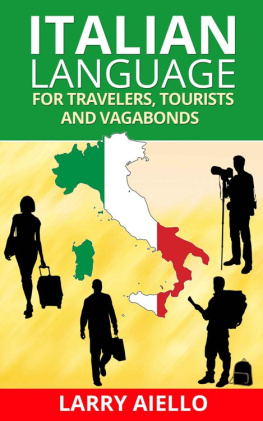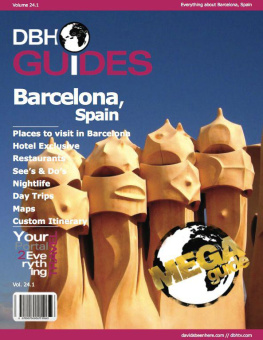The most overwhelming acknowledgement I owe is to the creators of the hundreds of Web sites covered in this book. Some of those sites of course are commercial, and though altruism is not their goal, the services those sites provide have changed in a very positive way the ways in which we plan our travel. Other sites in this book were created as a labor of love and deserve another level of acknowledgement for the hundreds or thousands of hours that their creators have put into creating sites that provide travelers with extraordinarily useful information. Just as we all do when we travel, in creating this book, I have very much relied on the kindness of strangers. I am very grateful for the exceptionally fine Web sites provided by organizations and individuals I dont personally know.
There are also many people that I do know who deserve credit for getting and keeping this book on its journey, particularly the many wonderful people at Information Today. Foremost, I thank Amy Reeve, Managing Editor, for her skills, insights, knowledge, understanding, and flexibility. Not far behind is John Bryans, Editor-in-Chief and Publisher, to whom I owe thanks for his support, enthusiasm, and numerous other attributes that I am sure he would be happy for me to mention but for which there is just not enough space here. I am also grateful to Heide Dengler (VP of Graphics and Production), Kara Mia Jalkowski (Book Designer), Sharon Hughes (Indexer), Shelley Szajner (Cover Designer), and Rob Colding (Marketing Coordinator) for all of the hard work and creativity they have applied to getting the book on its way. I also extend my thanks to Tom Hogan, Sr., President and CEO of Information Today, for having had the wisdom to identify and hire all these talented people.
I am also very grateful to David Grossman who wrote the Foreword. It has been a pleasure getting to know him again after a hiatus of more than 20 years.
Finally, I thank my wife, Pamela Pope Hock, for her continued support, patience, and love, and generally for continuing to put up with me.
Randolph Hock, PhD
Ran divides his work time between writing and teaching. On the teaching side, he specializes in customized courses to help people use the Web effectively (through his one-person company, Online Strategies). His courses have been delivered in more than a dozen countries, to companies, government agencies, nongovernmental organizations, schools, universities, and associations. On the writing side, The Travelers Web is his fourth book.
Ran has been a chemistry teacher and a librarian, and for many years he held training and management positions with Dialog Information Services and Knight-Ridder Information. He loves to travel, plan travel, think about travel, talk about travel, and write about travel. He has traveled extensively in the U.S. and abroad for both pleasure and work (but even counts most of the work travel also as pleasure). He has traveled by plane, train, ship, ferry, boat, canoe, car, bus, bicycle, horse, and rickshaw. He lives in Vienna, Virginia, with his wife, Pamela, and his two younger children, Stephen and Elizabeth. His older son, Matthew, like the rest of the family, is a traveler and spends considerable time traveling the U.S. and Europe with his band The Explosion.
Whether youre headed to Beijing on business, Cancun on a cruise, or Hawaii to learn the hula, using the Internet can probably make your trip less expensive, more productive, and more fun. The trick is knowing where and how to look, and sometimes, just what to look for. Millions of people have taken advantage of airfare savings they have found by shopping around on travel sites. Fewer, however, have used the Internet to research their destinations, find out what other people are saying about those destinations, plan the details of their routes, check the weather, learn the few words necessary to be polite in a foreign country, and generally take advantage of the wealth of travel resources that are available online.
Voyaging around the world and voyaging through the Internet have a lot in common. Both activities are often motivated by curiosity, the urge to explore, the need to relax, a desire to learn, and even profit. On top of that, the techniques, tricks, and general approaches that make these two activities fruitful and fun are actually very similar in several ways. Thus, the marriage between travel and the Internet is a natural one.
This book will explore this marriage by pointing to and describing the Internet resources that are the most useful to travelers. It will also emphasize certain techniques and approaches that work well whether you are at the keyboard or on the road. You will find the following themes reflected throughout the book:
Click everywhere, go everywhere. Explore around one more corner and try out one more link. Roam!
So many destinations, so little time.
Dont take just one persons word as to what is good for you.
All things in moderationincluding moderation itself. There are times to be extreme: Extremism in the pursuit of travel is not a vice. (Extra points for those of you who get that one.)
The Web sites covered reflect the breadth of travel-related topics and resources, and I try to demonstrate how to use these types of resources most effectively. Not every possible travel topic and certainly not all of the tens of thousands of travel sites out there will be included. However, for specific topics that are not covered, such as diving safaris, make use of the travel resource guides covered toward the end of this chapter and occasionally throughout the rest of the book. They should help you to easily find additional relevant sites. When somewhat specific topics are addressed, only carefully selected sites are included. The goal is to identify some of the best and most reliable sites, sites that are representative examples in various areas, and sites that provide a particularly useful and/or unique service.
A word about the organization of the book: Throughout, you will find some sites mentioned more than once. Many sites, such as Travelocity, serve many functions, providing online reservation services for flights, cars, cruises, etc., while also offering country and city guides, travel tips, and more. Such sites will be mentioned in more than one chapter, with emphasis on the part of the site that is most relevant to the chapter topic. This should make easy for you to keep track of all major sources for each topic without having to jump back and forth between chapters.
The Internet offers the traveler much more than just a place to make reservations. Each chapter in this book focuses on particular applications that travelers may use to their advantage. Following is a brief overview of the various applications and resources you will encounter on the Web and in this book.
Travel Guides Online ( )
If you are going to spend more than a day in any city or more than a few days in any country, break down and buy a good travel guidethe book kind. These are a travelers dream machine, more portable than a computer, and many will fit in your pocket. Even if your travel guide isnt pocketsize, keep it on your nightstand and spend a few minutes with it each night before you doze off. However, no matter how long you plan on staying at any destination, you should take advantage of the free guides that are available on the Internet for virtually any country, for almost any city, and for thousands of specific museums, monuments, and other attractions.
Many of the well-known printed guides, such as the Rick Steves Europe Through the Back Door and Arthur Frommers Budget Travel series, have companion Web sites that provide a surprising amount of information for free. These sites, which provide good overviews and basic details, are a good starting point for planning your adventures. Travel guides are covered in detail in .


